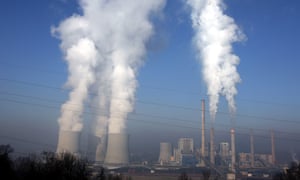Extract from The Guardian
Struggles remain on enacting 2015 Paris accord despite more clarity on emissions
The UN met on Saturday in Poland
to discuss a draft agreement on climate change, which sources said was
likely to pass, as exhausted delegates made compromises on some key
issues but left other contentious problems to be resolved next year.
The result will not be the breakthrough campaigners and some countries were hoping for, but will keep discussions alive on formulating key aspects of the implementation rules for the 2015 Paris accord.
Delegates have been thrashing out a text on the complex mechanisms required to put the Paris goals into effect for the past two weeks, and appeared partly successful as the talks overran their Friday deadline and looked likely to continue into late afternoon on Saturday at least.
The result will not be the breakthrough campaigners and some countries were hoping for, but will keep discussions alive on formulating key aspects of the implementation rules for the 2015 Paris accord.
Delegates have been thrashing out a text on the complex mechanisms required to put the Paris goals into effect for the past two weeks, and appeared partly successful as the talks overran their Friday deadline and looked likely to continue into late afternoon on Saturday at least.
The text will give countries clarity on key points such as accounting for their greenhouse gas emissions and recording their carbon reductions. They will also go some way to encourage the stepping up of each country’s climate change efforts.
Among the issues holding up progress is the highly technical question of what should happen to the market for carbon credits, held by some countries in recognition of their emissions-cutting efforts and their carbon sinks, such as forests.
These credits count toward countries’ emissions-cutting targets. Brazil introduced wording that would benefit the country for its huge rainforest cover, but critics said contained loopholes that allowed for double counting of carbon credits would severely undermine the integrity of the system.

Brazil has been a reliable supporter of the annual talks in the past and has worked to broker deals between the developed and developing world. Without that support in future, the talks are only likely to grow more fractious.
The US, Russia, Saudi Arabia and Kuwait have also played a disruptive role, watering down a resolution that would have welcomed the recent IPCC report that a temperature rise of 1.5C would have dire consequences.
The compromise in the redrafted text would have all countries “welcome the timely completion” of the IPCC report, but campaigners pointed out that this was weak because it refers merely to the timing of the report rather than its content. The EU, by contrast, and several other developed countries joined with scores of developing nations in announcing they would focus on preventing a 1.5C rise in their carbon-cutting efforts.
There were few new offers from the rich world of financing for developing countries to help them cut emissions and adapt to the effects of climate change, another issue that has been pushed to future talks.
As the last-minute negotiations wore on, delegates were saddened to hear of the death overnight of the veteran Philippine negotiator, Bernaditas de Castro Muller, who was a notable presence at the talks for nearly three decades. Tributes came from many who admired her forthright style.

No comments:
Post a Comment